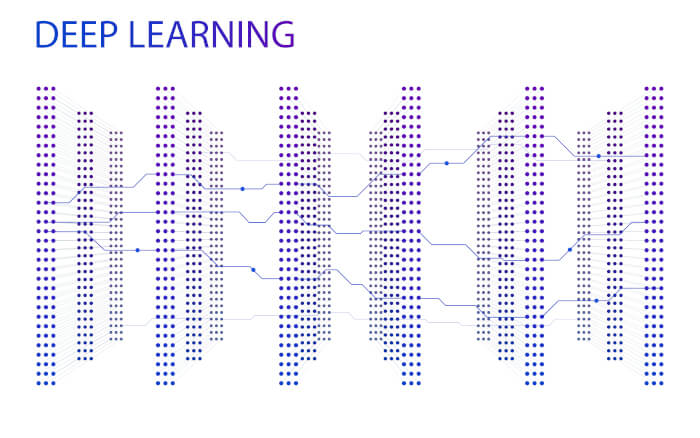TensorFlow is a powerful open source software library for high performance numerical computation using data flow graphs. Its flexible architecture allows easy deployment of computation across a variety of platforms (CPUs, GPUs, TPUs), and from desktops to clusters of servers to mobile and edge devices. The framework helps build and train neural networks for computer vision, natural language processing (NLP), speech recognition, and general predictive analytics.
TensorFlow comes with strong support for machine learning and deep learning and the flexible numerical computation core is used across many other scientific domains. It has many pre-built functions to ease the task of building different neural networks. TensorFlow allows distribution of computation across different computers, as well as multiple CPUs and GPUs within a single machine.
TensorFlow provides a Python API, as well as a less documented C++ API.
TensorFlow is by far the most popular machine learning library. It’s used by Google, OpenAI, NVIDIA, Intel, SAP, eBay, Airbus, Uber, Airbnb, Snap, Dropbox and startups.
Features include:
- Efficient, flexible, scalable, and maintainable.
- Python API.
- Portability: deploy computation to one or more CPUs or GPUs in a desktop, server, or mobile device with a single API.
- Visualization.
- Save and restore models, graphs.
- Auto-differentiation autodiff.
- Provides an extensive suite of functions and classes that allow users to define models from scratch.
- Provides users with pre-built algorithms for simpler model development.
- Supplies large data sets for training individual models.
- Many high level APIs are built on top of TensorFlow.
- Flexibility: Available on 64-bit Linux, macOS, Windows, and mobile computing platforms including Android and iOS. Run the software from Raspberry Pi, Android, Windows, iOS, Linux to server farms.
Website: www.tensorflow.org
Support: GitHub Code Repository, User Groups
Developer: The TensorFlow Authors
License: Apache License 2.0
The software was originally developed by researchers and engineers from the Google Brain team within Google’s AI organization.
TensorFlow is written in C++ and Python. Learn C++ with our recommended free books and free tutorials. Learn Python with our recommended free books and free tutorials.
Return to Deep Learning with Python
| Popular series | |
|---|---|
| The largest compilation of the best free and open source software in the universe. Each article is supplied with a legendary ratings chart helping you to make informed decisions. | |
| Hundreds of in-depth reviews offering our unbiased and expert opinion on software. We offer helpful and impartial information. | |
| The Big List of Active Linux Distros is a large compilation of actively developed Linux distributions. | |
| Replace proprietary software with open source alternatives: Google, Microsoft, Apple, Adobe, IBM, Autodesk, Oracle, Atlassian, Corel, Cisco, Intuit, SAS, Progress, Salesforce, and Citrix | |
| Awesome Free Linux Games Tools showcases a series of tools that making gaming on Linux a more pleasurable experience. This is a new series. | |
| Machine Learning explores practical applications of machine learning and deep learning from a Linux perspective. We've written reviews of more than 40 self-hosted apps. All are free and open source. | |
| New to Linux? Read our Linux for Starters series. We start right at the basics and teach you everything you need to know to get started with Linux. | |
| Alternatives to popular CLI tools showcases essential tools that are modern replacements for core Linux utilities. | |
| Essential Linux system tools focuses on small, indispensable utilities, useful for system administrators as well as regular users. | |
| Linux utilities to maximise your productivity. Small, indispensable tools, useful for anyone running a Linux machine. | |
| Surveys popular streaming services from a Linux perspective: Amazon Music Unlimited, Myuzi, Spotify, Deezer, Tidal. | |
| Saving Money with Linux looks at how you can reduce your energy bills running Linux. | |
| Home computers became commonplace in the 1980s. Emulate home computers including the Commodore 64, Amiga, Atari ST, ZX81, Amstrad CPC, and ZX Spectrum. | |
| Now and Then examines how promising open source software fared over the years. It can be a bumpy ride. | |
| Linux at Home looks at a range of home activities where Linux can play its part, making the most of our time at home, keeping active and engaged. | |
| Linux Candy reveals the lighter side of Linux. Have some fun and escape from the daily drudgery. | |
| Getting Started with Docker helps you master Docker, a set of platform as a service products that delivers software in packages called containers. | |
| Best Free Android Apps. We showcase free Android apps that are definitely worth downloading. There's a strict eligibility criteria for inclusion in this series. | |
| These best free books accelerate your learning of every programming language. Learn a new language today! | |
| These free tutorials offer the perfect tonic to our free programming books series. | |
| Linux Around The World showcases usergroups that are relevant to Linux enthusiasts. Great ways to meet up with fellow enthusiasts. | |
| Stars and Stripes is an occasional series looking at the impact of Linux in the USA. | |
